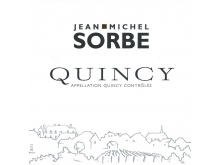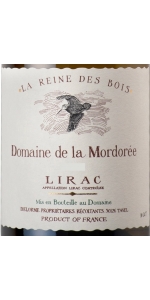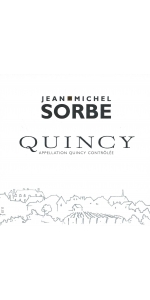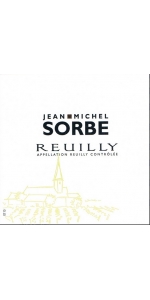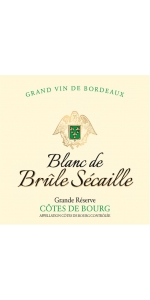Jean-Michel Sorbe Quincy Blanc 2021
6 bottles with free shipping for: $180.00
12 bottles with free shipping for: $300.00
| BUY MORE! SAVE MORE! | ||||||||||||||||||||
|
| Country: | France |
| Region: | Loire |
| Winery: | Joseph Mellot Jean-Michel |
| Grape Type: | Sauvignon Blanc |
| Vintage: | 2021 |
| Bottle Size: | 750 ml |
Jean-Michel Sorbe Quincy Blanc is made from 100 percent Sauvingon Blanc.
The first nose is expressive and opens up to notes of acacia, citrus (lemon, grapefruit). Full on the palate with lovely freshness. This wine boasts nice balance and good length.
The vines are 15 to 20 years old and are located on the left bank of the Cher River, southwest of Quincy. This vineyard enjoys good exposure to the sun and overlies hillocks composed of sandy alluvial deposits and gravel dating back to the Quaternary Period. Each terroir is managed with minimal intervention in an environmentally friendly approach. Vinification: Slow pressing. Fermentation took place under controlled temperatures (18°C).The wine was aged on fine lees for a minimum of 4 months. It was filtered only once before being bottled.
Pair with crustaceans, asparagus, or goat's cheeses.
After pouring, allow the wine to breathe for a few moments in the glass before enjoying so that it may fully release all of its aromas.
The Domaine Joseph Mellot Jean-Michel Estate
Located in the town of Preuilly, Domaine Joseph Mellot is one of the leaders in the Loire Valley. The Mellot dynasty was founded in Sancerre almost five centuries ago by Pierre-Etienne Mellot and, since then, the family has always been involved in winemaking. In fact, in 1698 Cesar Mellot was entrusted with the weighty task of advising King Louis XIV on his choice of wines. Throughout the years, each new generation has continued to enrich and perfect the family's winemaking skills. In 1984, Joseph's son, Alexandre, took over the estate with quality as his main objective and a focus on the artisanal winemaking process and philosophy transmitted from one owner to the other.
Jeam-Michel Sorbe took over the family estate in 1973 and for about 30 years devoted his energy and passion to develop the reputation if the Quincy and Reuilly appellations. His wines had a great success and Jean-Michel Sorbe became a well-known personality in the region.
The Sorbe and Mellot families met through a mutual friend and began working together in 1988. In 1999, since his children had chosen to follow other paths, Jean-Michel decided to hand his estate over to Alexandre Mellot.
The Domaine Joseph Mellot Jean-Michel Vineyards
They farm 11 hectares (27 acres) in Reuilly (10 hectares in the commune of Preuilly, 1 hectare in Reuilly), and 3 hectares (7.4 acres) in Quincy.
Soils:
- Preuilly: orange colored clay on ancient alluvial deposits (clay and silt). Deep, structured sols.
- Reuilly: grainy sand, Fairly light soils with a clay subsoil.
- Quincy: 2 parcels are planted on alluvial deposits (sand and gravel from the beginning of the quaternary period); 1 parcel has a higher clay content with the presence of lacustrine limestone on the surface.
The Quincy appellation (A.O.C. founded in 1936) measures 200 hectares (494 acres). It is the second oldest A.O.C. in France after Châteauneuf du Pape. The appellation almost disappeared as a wine after World War II, but today is staging a come back with new blood and new plantings. The vineyards lie around and between two towns, Quincy and Brinay. Quincy is a A.O.C. on the move and its A.O.C. status only applies to white wines, not red or rosé.
The vineyards of Reuilly (A.O.C. founded in 1939) measures 150 hectares (370.50 acres). The grapes grown are Sauvignon, Pinot Gris, and Pinot Noir. Reuilly was once known for a vin Gris de Pinot Noir, which today is 15% of the area’s production.
Diane de Galinière is another property owned by Joseph Mellot. Once again, they have decided to keep the yield low in order to obtain the best quality. Coteaux du Giennois A.O.C. was unknown a few years ago and is now an appellation to watch thanks to the care provided by Joseph Mellot. The Coteaux du Giennois vineyards measure 160 hectares (395.2 acres) composed of siliceous-clay soil in the northern part and Kimmeridgian marl in the south.
Mordoree Lirac Blanc Reine des Bois is made from Grapes : Grenache 35 % Clairette 25 % Viognier 10 % Roussanne 15 % Marsanne 10 % Picpoul 5%>
Color : green gold
Aromas : white fruits, peach, apricot, pear, violet.
Palate : rounded, long finish, highly flavoured.
Ageing Potential : 4-5 years.
Surface : 4 Ha. Yield : 35 Hl./Ha. Vineyard age : 30 years Terroir : Clay / chalk with pebble stones. Harvest : by hand Vinification : skin maceration and direct pressing with temperature control. Fermentation : oak barrel fermentation for 25% of the total volume
Pairs well with appetizers, fish, seafood.
Review:
"Iconic grapes of 35% Grenache, 25% Clairette, 10% Viognier, 15% Roussanne, 10% Marsanne, and 5% Picpoul from 40-year-old vines make up this organic Southern Rhône white. A floral bouquet of white tea and jasmine make their designs on a defined slate mouthfeel. Lime pops with a tart center, along with notes of peach and gingerbread on a keen, edgy finish."
- The Somm Journal (Feb/March 2022), 94 pts
Jean-Michel Sorbe Quincy Blanc is made from 100 percent Sauvignon Blanc.
The first nose is expressive and opens up to notes of acacia, citrus (lemon, grapefruit). Full on the palate with lovely freshness. This wine boasts nice balance and good length.
The vines are 15 to 20 years old and are located on the left bank of the Cher River, southwest of Quincy. This vineyard enjoys good exposure to the sun and overlies hillocks composed of sandy alluvial deposits and gravel dating back to the Quaternary Period. Each terroir is managed with minimal intervention in an environmentally friendly approach. Vinification: Slow pressing. Fermentation took place under controlled temperatures (18°C).The wine was aged on fine lees for a minimum of 4 months. It was filtered only once before being bottled.
Pair with crustaceans, asparagus, or goat's cheeses.
After pouring, allow the wine to breathe for a few moments in the glass before enjoying so that it may fully release all of its aromas.
All older vintage wines have been purchased from a single collectors cellar. Pictures can be requested before shipment.
Jean-Michel Sorbe Quincy Blanc is made from 100 percent Sauvingon Blanc.
The first nose is expressive and opens up to notes of acacia, citrus (lemon, grapefruit). Full on the palate with lovely freshness. This wine boasts nice balance and good length.
The vines are 15 to 20 years old and are located on the left bank of the Cher River, southwest of Quincy. This vineyard enjoys good exposure to the sun and overlies hillocks composed of sandy alluvial deposits and gravel dating back to the Quaternary Period. Each terroir is managed with minimal intervention in an environmentally friendly approach. Vinification: Slow pressing. Fermentation took place under controlled temperatures (18°C).The wine was aged on fine lees for a minimum of 4 months. It was filtered only once before being bottled.
Pair with crustaceans, asparagus, or goat's cheeses.
After pouring, allow the wine to breathe for a few moments in the glass before enjoying so that it may fully release all of its aromas.
Jean-Michel Sorbe Reuilly Blanc is made from 100 percent Sauvignon Blanc.
The first nose is expressive and opens up to notes of acacia, citrus (lemon, grapefruit). Full on the palate with lovely freshness. This wine boasts nice balance and good length.
The vines are 15 to 20 years old and are located on the left bank of the Cher River, southwest of Quincy. This vineyard enjoys good exposure to the sun and overlies hillocks composed of sandy alluvial deposits and gravel dating back to the Quaternary Period. Each terroir is managed with minimal intervention in an environmentally friendly approach. Vinification: Slow pressing. Fermentation took place under controlled temperatures (18°C).The wine was aged on fine lees for a minimum of 4 months. It was filtered only once before being bottled.
Pair with crustaceans, asparagus, or goat's cheeses.
After pouring, allow the wine to breathe for a few moments in the glass before enjoying so that it may fully release all of its aromas.
Jean-Michel Sorbe Reuilly Blanc is made from 100 percent Sauvignon Blanc.
The first nose is expressive and opens up to notes of acacia, citrus (lemon, grapefruit). Full on the palate with lovely freshness. This wine boasts nice balance and good length.
The vines are 15 to 20 years old and are located on the left bank of the Cher River, southwest of Quincy. This vineyard enjoys good exposure to the sun and overlies hillocks composed of sandy alluvial deposits and gravel dating back to the Quaternary Period. Each terroir is managed with minimal intervention in an environmentally friendly approach. Vinification: Slow pressing. Fermentation took place under controlled temperatures (18°C).The wine was aged on fine lees for a minimum of 4 months. It was filtered only once before being bottled.
Pair with crustaceans, asparagus, or goat's cheeses.
After pouring, allow the wine to breathe for a few moments in the glass before enjoying so that it may fully release all of its aromas.
Brulesecaille Blanc Grande Reserve is made from 75% Sauvignon Blanc, 25% Sauvignon Gris.
Average age of the vines is 25 years.
Manual harvest from September 19th-20th 2016.
Direct press at low pressure (whole cluster) with low amount of SO2, settling at 10°C.
Addition of yeast and alcoholic fermentation in casks 400 liters.
Raised on the lees for 6 months with regular batonnage (stirring of the lees).
Bottling in april 2017.
Fish, seafood, white meats, fine goat cheeses.
- back
Leindl Gruner Veltliner Seeberg Kamptal is made form 100 percent Gruner Veltiner. Medium yellow green. Fine yellow apple fruit, delicate hint of quince and honey, candied orange zest, highly attractive bouquet. Juicy, good complexity, extract core sweet, silky texture, fine acidity bow, fine and salty minerality, great length, secure aging potential, a very finesse Veltliner-style.
Review:
“Inviting nose, with layers of quince and elegant, aromatic herb leading through to a richly textured palate of opulent fruit and a fine acidity.”
- Decanter World Wine Awards 2023, 96 pts
GRAPE
100% Arneis
POSITION
Hillside
EXPOSURE
Southwest
COLOR
Straw yellow with greenish reflections
NOSE
The bouquet is fruity with hints of chamomile and acacia
TASTE
Fresh elegant, fruity aromas with floral hints
TEMPERATURE
Ideal serving temperature is 8°/10°C.
ALCOHOL
12.5 % - 13%

